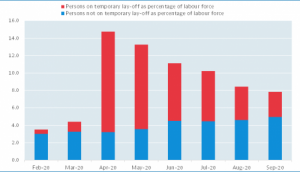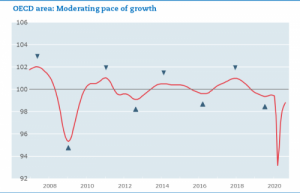Finance & Economics
MENA: Global Action is Urgently Needed to Reverse Damaging Jumps in Extreme Poverty
The World Bank’s biennial Poverty and Shared Prosperity report finds that the rate of extreme poverty in the MENA region rose from 3.8% in 2015 to 7.2% in 2018 — the latest year for which data is available. This followed another rise in poverty in the region from 2.3% to the levels in 2015. According to the report, the latest jump in poverty in MENA was driven largely by the effects of ongoing conflict in Syria and Yemen, but this does not fully account for the economic downturn in Lebanon.
- Read more
- 314 reads
International community renews commitment to address tax challenges from digitalisation of the economy
The international community has made substantial progress towards reaching a consensus-based long-term solution to the tax challenges arising from the digitalisation of the economy, and agreed to keep working towards an agreement by mid-2021, according to a Statement released on Oct.12.
- Read more
- 305 reads
Unemployment Rates, OECD - Updated: October 2020

- Read more
- 333 reads
Consumer Prices, OECD - Updated: 5 October 2020
Annual inflation in the OECD area overall was stable at 1.2% in August 2020. Energy prices continued to fall in August (minus 7.1%), but at a slower pace than in July (minus 8.4%), while food price inflation picked up slightly to 3.9%, compared with 3.8% in July. OECD annual inflation excluding food and energy decreased slightly, to 1.6% in August 2020, compared with 1.7% in July.
- Read more
- 324 reads
Composite Leading Indicators (CLI), OECD, October 2020

- Read more
- 302 reads
South Asia: Worst Economic Plunge, Informal Workers Hit Hardest
South Asia is set to plunge into its worst-ever recession as the devastating impacts of COVID-19 on the region’s economies linger on, taking a disproportionate toll on informal workers and pushing millions of South Asians into extreme poverty, says the World Bank in its twice-a-year-regional update.
- Read more
- 316 reads
World Bank Confirms Economic Downturn in Sub-Saharan Africa, Outlines Key Polices Needed for Recovery
Driven by the economic fallout of the COVID-19 global pandemic, growth in Sub-Saharan Africa is predicted to fall to -3.3 percent in 2020, pushing the region into its first recession in 25 years, according to the latest regional economic analysis Africa’s Pulse: Charting the Road to Recovery. The pandemic could also drive up to 40 million people into extreme poverty in Africa in 2020, erasing at least five years of progress in fighting poverty.
- Read more
- 297 reads
Sweden: EU further supports innovative battery technology through Nilar
* EIB provides EUR 47m loan to Swedish battery tech company Nilar International AB with backing from the EU’s InnovFin “Energy Demo Projects” guarantee programme.
* Financing will support Nilar in scaling up production of its unique and safe battery system as well as boost R&D in innovative battery technology.
- Read more
- 305 reads
IMF Executive Board Approves an Additional US$101.96 Million Disbursement under the Rapid Credit Facility for Malawi to Address the COVID-19 Pandemic
The Executive Board of the International Monetary Fund (IMF) approved on October 2nd, a disbursement of SDR 72.31 million (US$101.96 million or 52.1 percent of quota) to Malawi under the Rapid Credit Facility (RCF).
- Read more
- 308 reads
IMF Executive Board Approves 27-month US$6.5 billion Extended Fund Facility for Ecuador
The Executive Board of the International Monetary Fund (IMF) approved on September 30, a 27-month extended arrangement under the Extended Fund Facility (EFF) for Ecuador, with access equivalent to SDR 4.615 billion (661 percent of quota, equivalent of US$6.5 billion). The Board’s approval allows for an immediate disbursement equivalent to US$2 billion, available to the budget.
- Read more
- 315 reads
Human Rights
Ringing FOWPAL’s Peace Bell for the World:Nobel Peace Prize Laureates’ Visions and Actions

Protecting the World’s Cultural Diversity for a Sustainable Future

The Peace Bell Resonates at the 27th Eurasian Economic Summit

Declaration of World Day of the Power of Hope Endorsed by People in 158 Nations

Puppet Show I International Friendship Day 2020

